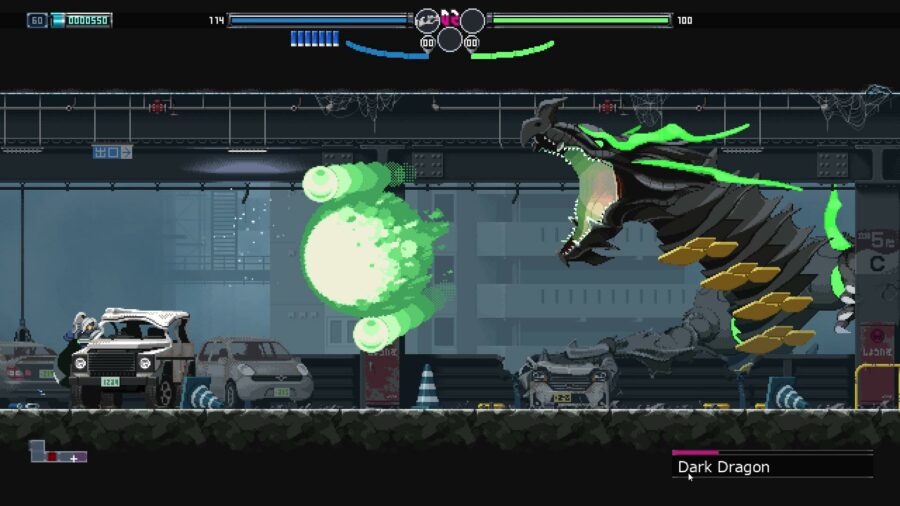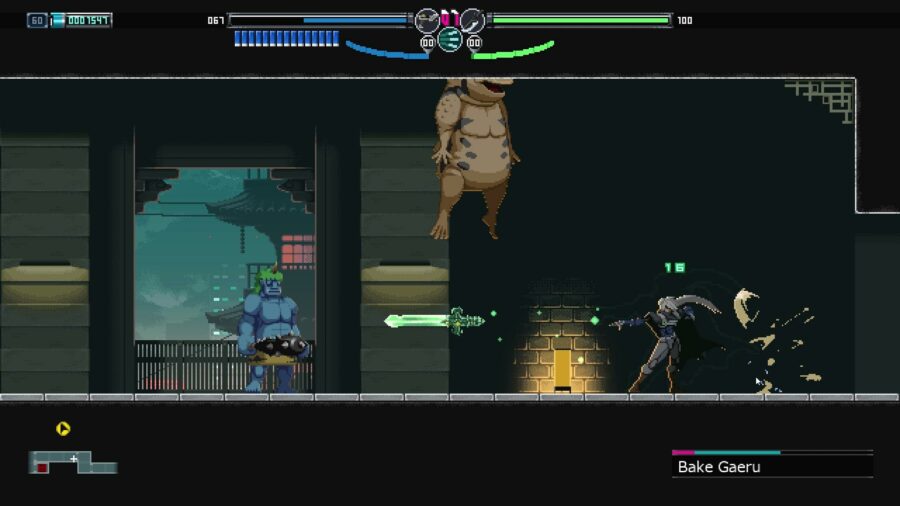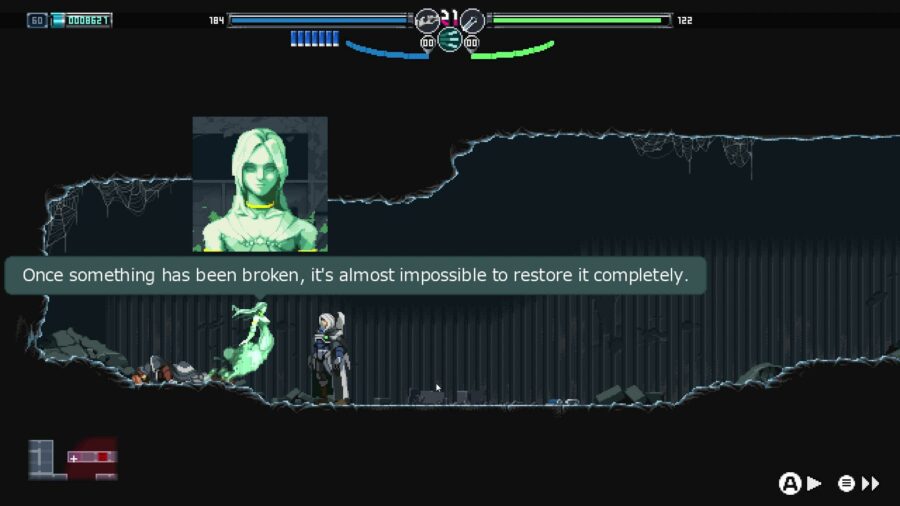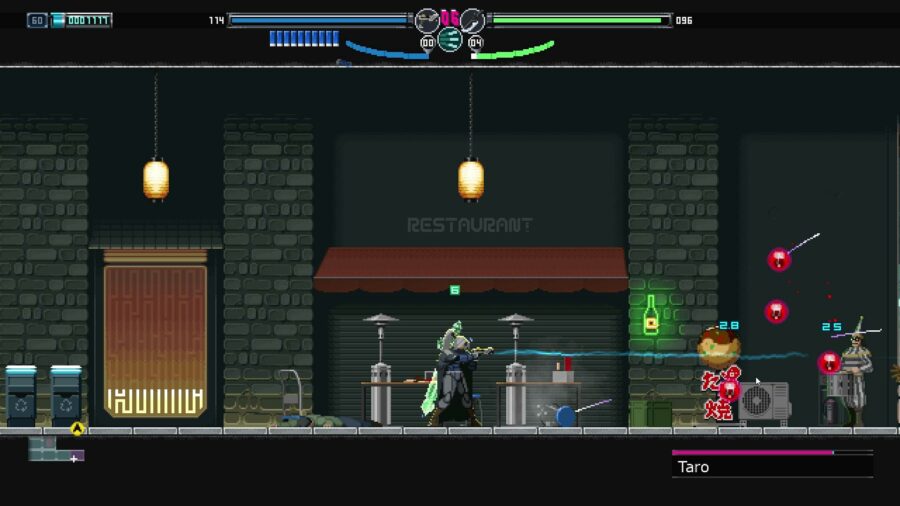Someone recommended Blade Chimera to me as a sort of palette cleanser, and I’m glad they did. At a point when the term “Metroidvania” is starting to lose all meaning, Blade Chimera is a fun, fast-moving flashback to the classic 2D action games that originally lent their name to the subgenre.
I didn’t realize this before I started, but Blade Chimera was developed by the Japanese studio Team Ladybug, which previously made 2021’s Record of Lodoss War: Deedlit in Wonder Labyrinth. I enjoyed that game, which is a similarly classic sort of Metroidvania, but it ends right when it feels like it’s hitting its stride.
Blade Chimera is a much bigger project, which draws on equal parts mythology, cyberpunk, and anime. It’s got a couple of annoying glitches and an inconsistent difficulty curve, but BC plays out like a list of reasons why people like Metroidvanias in the first place.

BC is set in 2065, 30 years after the appearance of a horde of demons that wiped out most of human civilization. Survivors have built an enclave in the ruins of Osaka, which is defended by a religious order of warriors called the Holy Union.
Shin is one of the Union’s Venerators, a solo operator who investigates reports of demonic activity throughout the city. He’s also an amnesiac, with no memory of who he was before he joined the Union.
After being dispatched to investigate a disturbance at an abandoned shopping mall, Shin meets Lux, a friendly sword demon with the power to manipulate time. She offers to partner up with him, which saves Shin’s life about 5 minutes later. However, meeting a demon who isn’t simply a mindless killer shakes Shin’s faith in the teachings of the Holy Union. That puts him and Lux on a collision course with Shin’s superiors, his past, and the demons that still threaten Osaka.

The word I keep wanting to use for BC is “competent,” which sounds like I’m damning it with faint praise. It’s a game that was made by a team that understands their genre. Almost everything about it just works, from its combat systems to its smooth animation to its pixel art, to a degree that I’ve come to appreciate as rare.
BC starts slow, with Shin on a solo mission, and gives you a few simple challenges before Lux shows up. If you’ve played a decent 2D action game in the last 30 years, from Ninja Gaiden to Neva, you’ll have a feel for BC almost immediately.
Shin comes equipped with a dodge roll that provides a generous number of invincibility frames and two slots in which to equip weapons. That includes a variety of firearms, alongside standard RPG gear like swords, knives, and whips.
The guns are a weird highlight here, if only because I thought they’d be useless. I grew up playing Japanese games like Dead Rising and Aria of Sorrow where guns were present, but dealt lousy damage compared to any kind of melee attack. Instead, they’re effective and dangerous from the start in BC. Once you get hold of a shotgun, most of the demons in Osaka no longer pose a serious threat.

Once Lux joins the team, you gain access to her weird style of magic. You can use Lux to exploit tears in time, which rewind the clock on specific objects in your environment: missing items reappear, broken vehicles fix themselves, and strong memories become visible. You can also stick Lux into nearby walls, which lets you use her blade as a stepping stone or trigger certain switches.
As you make progress, Shin and Lux end up interacting with one another in an interesting way. Lux’s abilities all run off of your MP meter, which gets refilled when you inflict damage with Shin’s weapons. Conversely, Shin heals slightly whenever you hit enemies or destructible objects with Lux’s blade. You’re a lot more self-sufficient in the field in BC than in most games in its lane.
When you level up, you earn points to spend on Lux’s skill tree to unlock more abilities. This includes the genre-standard double jump and slide kick, a few expensive subweapon attacks, the ability to spin Lux in place as an improvised shield, and most crucially, a passive skill that lets you warp directly to any explored space on the map at almost any time.

The warp skill sticks out to me, as it’s the kind of random quality-of-life bonus that many other action games would be terrified to give to the player. BC’s got a lot of features like that, where it simply hands you a skill, ability, or item that, at a glance, seems completely broken. Shin and Lux’s self-healing is another good example, or some of Lux’s bigger direct nuke spells.
The trade-off is that much of BC is a game of rocket tag. Shin’s HP doesn’t go up automatically with each level, so unless you carefully explore every inch of the map for upgrades, he can end up feeling remarkably fragile. Your self-healing and big spells are huge assets, but there are plenty of areas in BC’s Osaka where a new enemy or hazard can unceremoniously cut you in half. The result is a game that can feel really easy, right up until it suddenly doesn’t.
That uneven difficulty might be BC’s biggest flaw, alongside a couple of issues I’ve had with Lux’s controls. Sometimes she simply won’t come out at all when I hit the appropriate button, or will stick in a wall at an angle for no apparent reason.
That’s my only real complaint, though. I could see someone bouncing off of Blade Chimera if their tolerances for Metroidvanias or anime are lower than mine, but if you’ve ever enjoyed other games in its genre pool, there’s no reason not to pick it up. It’s a short, fun run through a surprisingly cozy apocalypse. If Team Ladybug ever wants to come back to this universe, I’d be interested.
[Blade Chimera, developed by Team Ladybug and published by PLAYISM, is now available for Nintendo Switch and Steam for $19.99. This column was written using a Steam code sent to Hard Drive by a PR representative from PLAYISM.]




